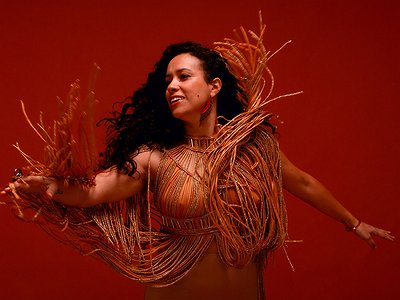Name: Mariana Alejandra Yegros aka La Yegros
Nationality: Argentinian
Occupation: Singer, songwriter
Current Release: The new La Yegros album Haz is out via Canta La Selva.
If you enjoyed this La Yegros interview and would like to stay up to date with her music and releases, visit her official homepage. She is also on Instagram, and Facebook.
Do you think some of your early musical experiences planted the seed of your interest in voice and singing? How and when did you start singing?
I believe that the music I listened to as a child had a great influence.
Traditional music like chamamé or cumbia was my soundtrack at that time.
If you also play other instruments, how does the expressive potential of these compare to your own voice?
I have studied piano and a bit of percussion, but I think my natural instrument is my voice.
With the voice, I feel like I can play and deeply connect to musical expression and the audience.
Singing is part of all cultures and traditions. Which ones inspire you and why?
There are different voices of African origin, or from India that have been a great inspiration for me, especially in the beginning.
Also, traditional singers like the Colombian Petrona Martinez, the Argentine Mercedes Sosa, the Peruvian Susana Baca, etc .. have been a great inspiration for expressing tradition. They left behind a cultural legacy with very authentic and realistic messages from their place of origin.
How would you describe the physical sensation of singing? [Where do you feel the voice, do you have a visual sensation/representation, is there a feeling of release or tension, etc.?]
The physical sensation is one of fulfillment.
When the voice is well balanced, I feel like a channel of expression throughout my being. It resonates in my head, my chest expands, the diaphragm does its job, and the voice releases magic, dynamics - a lot of emotion.
What type of stages and musical situations do you think are ideal for your own voice?
I really like the setting of a concert hall where there is a more intimate resonance than at large outdoor festivals.
A hall is generally acoustically treated, which helps the voice to be heard more clearly and precisely.
We have a speaking voice and a singing voice. Do you think they are natural extensions of each other, extremes of a spectrum, or different?
In my case, many people tell me they don't recognize my spoken voice from my singing voice. It's as if we're two different beings.
After much experimentation, I personally think I have been finding inflections, sounds, accents, pronunciations of words that I only do when singing. It's something that didn't exist; I had to create it to achieve an identity in my singing voice.
When you write the lyrics of a song, do you feel or see a connection between your voice and the text? Does it need to feel and sound "right" or "correct" to sing certain words? What do you think about singing others' songs versus your own?
I don't usually write lyrics outside of a melody. I don't keep a notebook where I write to then put music to it. When I compose, I like to do it over a melodic base. That helps me a lot to find nuances, phrasings, play with pronunciation.
I don't need to sound good in the creation process. What matters most to me is that it has soul, that it emotionally moves me sonically. Once that it in place, everything takes shape.
Tension is a particularly serious problem for many vocalists. How do you take care of your voice? Are there recipes or techniques to recover the form of a damaged voice?
I take very good care of my voice every day. But especially so when I'm recording an album or going on tour. I always have a handkerchief with me, even in summer. When I rehearse a lot, I avoid speaking afterwards, until the next day. I never drink cold water. Honey, ginger, and tea are my indispensable allies.
Many years ago, before I started my professional career, I had to take a hiatus. During this time, I managed to heal my voice with an excellent speech therapist who, through strength exercises, made the problems disappear.
From then on, I understood that my voice has no replacement. I can't buy it in a store. I take care of it like a newborn baby.
How has technology, such as autotune or effects processing, influenced singing? Has it been a concrete influence on your own approach?
Technology helps not to waste so much time singing the same part several times.
We haven't used it Auto-Tune, as an effect on this album. But for a compilation we are doing live, I did, in some phrases.
I like the idea of approaching the audience with aesthetics that are in fashion, without overdoing it.
For recording engineers, the human voice remains a difficult element to capture. From your point of view, what makes voices sound good both on record and live?
Gaby Kerpel, my musical producer for all the albums, has said about this:
"It is essential to capture the artist's or singer's emotion in the best possible way, from having the best microphone possible and also having the possibility to choose the most suitable one for each voice. Then, depending on the style you want to achieve, it will depend on the overdubs, harmonies, and effects used in the mix."
In our case, we have also noticed that my voice blends very well with Kerpel's. So he sang many of the choruses, as it we knew that worked really well.




